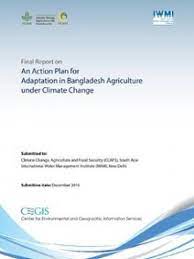🌿 COP 30 - Building a Greener Tomorrow
The 30th UN Climate Change Conference (COP 30) is taking place in Belém, Brazil. Stay informed about global climate actions, negotiations, and live sessions from 10 – 21 November 2025.
Get Updates
An Action Plan for Adaptation in Bangladesh Agriculture under Climate Change

Files
Date
December, 2016Author(s)
- Dr. M. Asaduzzaman
- Mr. M. Qamar Munir
- Dr. Sk. Ghulam Hussain
- Mr. Malik Fida A. Khan
- Mr. Mohammad Abdur Rashid
- Mr. Ahmmed Zulfiqar Rahaman
- Mr. Md. Kamruzzaman Akand
Abstract
Bangladesh agriculture has come a long way over the last quarter of a century, which accounts for around 16% of GDP at present. Crop sub-sector contributes the lion's share to it, 9 percentage points at the moment. Agriculture in Bangladesh is influenced by climate, its seasonal characteristics and different climatic variables such as temperature, rainfall, humidity, day-length etc. Consequently, climate change as indicated by a rising trend in average temperature and volatility of the precipitation regime will affect agriculture to an extent. On average, weather related natural hazards such as flood and drought as well as salinity already affect respectively 34%, 15% and 4% of total households affected by all hazards and associated with 23%, 6% and 3% respectively of total damage and losses occurring in Bangladesh during 2009-14. Among the sectors, crop cultivation experienced the highest damage and loss (around 36%). The frequency and severity of all these hazards may increase over time as climate change unfolds and with it the prospects for agriculture in general is also going to be uncertain possibly jeopardising food security in the country. For future food security it is absolutely necessary to understand how Bangladesh agriculture can advance in future under climate change. Adaptation to these climatic and related uncertainties thus becomes an urgent task for the country. At its sixteenth session the Conference of Parties (COP) under the United Nations Framework Convention on Climate Change (UNFCCC) took a decision and further elaborated at its seventeenth session in Durban to initiate the process of formulating National Adaptation Plans (NAP) as a way to facilitate effective planning in least developed countries (LDCs) to address climate change issues. The present study is an attempt to prepare an adaptation plan for crop agriculture, which is expected to be an integral part of such a NAP process as and when it begins.
Citation
Bangladesh agriculture;precipitation;average temperature
Publisher
CEGIS
Rights Holder
CEGIS
URI
https://knowledgehub.pksf.org.bd/collections/NHIzU1pTazEzeEI4Y0lMa1djVHhJdz09
